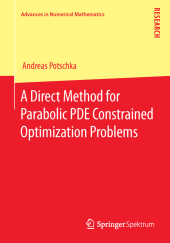 Neuerscheinungen 2014Stand: 2020-02-01 |
Schnellsuche
ISBN/Stichwort/Autor
|
Herderstraße 10
10625 Berlin
Tel.: 030 315 714 16
Fax 030 315 714 14
info@buchspektrum.de |

Andreas Potschka
A Direct Method for Parabolic PDE Constrained Optimization Problems
2014. XIV, 216 S. 30 SW-Abb., 11 Tabellen. 210 mm
Verlag/Jahr: SPRINGER, BERLIN; SPRINGER FACHMEDIEN WIESBADEN 2014
ISBN: 3-658-04475-6 (3658044756)
Neue ISBN: 978-3-658-04475-6 (9783658044756)
Preis und Lieferzeit: Bitte klicken
Andreas Potschka discusses a direct multiple shooting method for dynamic optimization problems constrained by nonlinear, possibly time-periodic, parabolic partial differential equations. In contrast to indirect methods, this approach automatically computes adjoint derivatives without requiring the user to formulate adjoint equations, which can be time-consuming and error-prone. The author describes and analyzes in detail a globalized inexact Sequential Quadratic Programming method that exploits the mathematical structures of this approach and problem class for fast numerical performance. The book features applications, including results for a real-world chemical engineering separation problem.
Parabolic PDE Constrained Optimization Problems.- Two-Grid Newton-Picard Inexact SQP.- Structure Exploiting Solution of QPs.- Applications and Numerical Results.
From the book reviews:
"The thesis is well written and organized, structured in three parts: theoretical foundations, numerical methods, and applications and numerical results. The target groups are researches and students in the fields of mathematics, information systems and scientific computing as well as users confronted with PDE constrained optimization problems." (Ctirad Matonoha, zbMATH, Vol. 1293, 2014)
Dr. Andreas Potschka is a postdoctoral researcher in the Simulation and Optimization group of Prof. Dr. Dres. h. c. Hans Georg Bock at the Interdisciplinary Center for Scientific Computing, Heidelberg University. He is the head of the research group Model-Based Optimizing Control.


